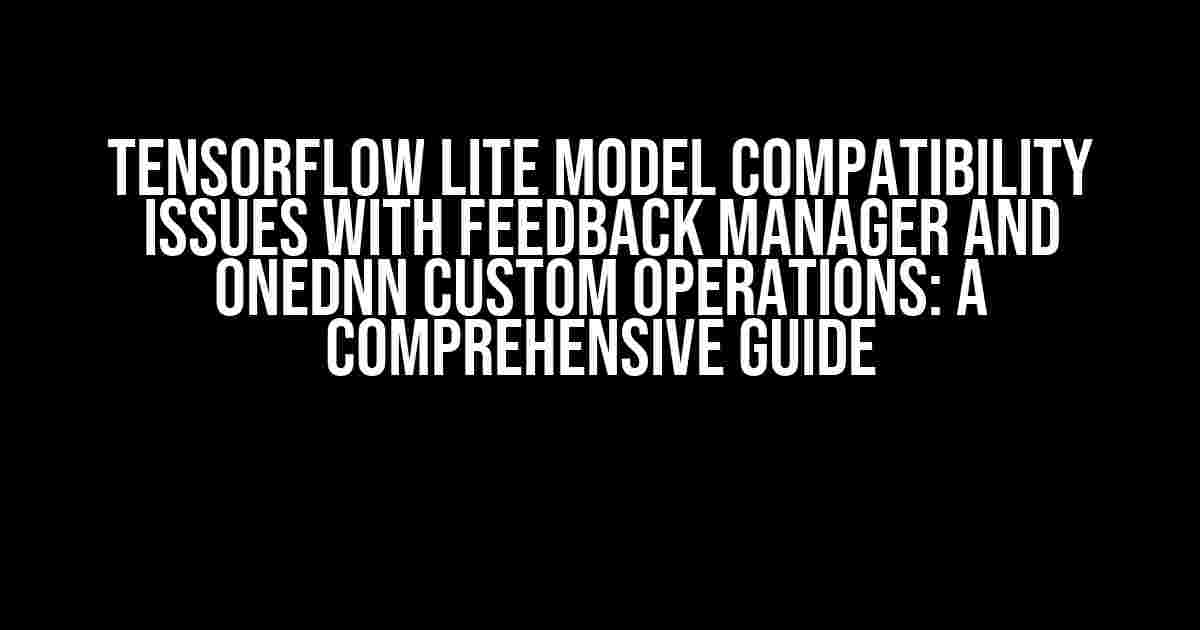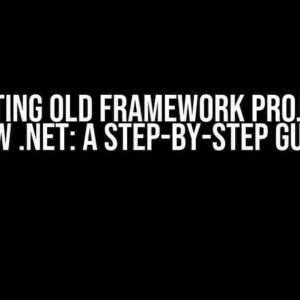As AI and machine learning continue to revolutionize various industries, the demand for efficient and reliable ML models has increased significantly. TensorFlow Lite, an optimized version of TensorFlow, has become a popular choice for deploying ML models on mobile and embedded devices. However, with the rise of custom operations and feedback managers, compatibility issues have become a major concern. In this article, we’ll delve into the world of TensorFlow Lite model compatibility issues with Feedback Manager and oneDNN custom operations, providing you with clear instructions and explanations to overcome these hurdles.
Understanding TensorFlow Lite and its Limitations
TensorFlow Lite is a lightweight version of TensorFlow, designed to reduce the complexity and computational requirements of ML models. By converting TensorFlow models to TensorFlow Lite, developers can achieve faster inference times, reduced memory usage, and improved performance on resource-constrained devices. However, this optimization process comes with some limitations:
- TensorFlow Lite models are not compatible with all TensorFlow operations.
- Custom operations and kernel implementations may not be supported.
- Device-specific optimizations can lead to compatibility issues.
Feedback Manager: A Key Component in TensorFlow Lite
Feedback Manager is a crucial component in TensorFlow Lite, responsible for providing feedback to the model during inference. This feedback is used to improve the model’s performance and accuracy. However, Feedback Manager can also introduce compatibility issues when working with custom operations:
feedback_manager.cc is the primary file responsible for handling feedback in TensorFlow Lite. When you add custom operations to your model, you need to ensure that they are compatible with the Feedback Manager.
// Example code snippet:
// Adding a custom operation to the Feedback Manager
REGISTER.FeedbackManagerOp("MyCustomOp", {"input_operand"}, {"output_operand"});
oneDNN Custom Operations: A Powerhouse for Neural Networks
oneDNN (formerly known as mkldnn) is a popular open-source library for deep neural networks. It provides optimized implementations for various neural network layers, making it an attractive choice for custom operations in TensorFlow Lite models. However, oneDNN custom operations can also lead to compatibility issues:
When using oneDNN custom operations, you need to ensure that they are correctly registered with the TensorFlow Lite runtime. Failure to do so can result in errors during model conversion or inference.
// Example code snippet:
// Registering a oneDNN custom operation with TensorFlow Lite
REGISTER_TFLITE_OP(MyOneDNNOps::MyGEMM) {
.opcode = TFLITE_ONE_DNN_GEMM,
.version = 1,
.buffer_idx = 0,
};
Common Compatibility Issues with Feedback Manager and oneDNN Custom Operations
When working with Feedback Manager and oneDNN custom operations, you may encounter the following compatibility issues:
- Invalid or missing Feedback Manager registration: Ensure that your custom operation is correctly registered with the Feedback Manager.
- oneDNN custom operation registration errors: Verify that your oneDNN custom operation is correctly registered with the TensorFlow Lite runtime.
- Mismatched data types and formats: Ensure that the data types and formats used in your custom operation match those expected by the Feedback Manager and oneDNN.
- Incompatible kernel implementations: Verify that your custom operation’s kernel implementation is compatible with the Feedback Manager and oneDNN.
Solving Compatibility Issues: Step-by-Step Guide
Now that we’ve covered the common compatibility issues, let’s dive into a step-by-step guide to resolving them:
-
Verify Feedback Manager Registration: Check that your custom operation is correctly registered with the Feedback Manager. Review the
feedback_manager.ccfile and ensure that your operation is listed. -
Review oneDNN Custom Operation Registration: Verify that your oneDNN custom operation is correctly registered with the TensorFlow Lite runtime. Check the
REGISTER_TFLITE_OPmacro and ensure that it matches the expected format. -
Check Data Types and Formats: Ensure that the data types and formats used in your custom operation match those expected by the Feedback Manager and oneDNN. Review the documentation for each component to ensure compatibility.
-
Validate Kernel Implementations: Verify that your custom operation’s kernel implementation is compatible with the Feedback Manager and oneDNN. Review the kernel implementation and ensure that it adheres to the expected interface.
-
Test and Debug: Thoroughly test and debug your custom operation with the Feedback Manager and oneDNN. Use TensorFlow Lite’s built-in debugging tools to identify and resolve issues.
| Issue | Solution |
|---|---|
| Invalid or missing Feedback Manager registration | Verify registration in feedback_manager.cc |
| oneDNN custom operation registration errors | Verify registration using REGISTER_TFLITE_OP macro |
| Mismatched data types and formats | Review documentation and ensure compatibility |
| Incompatible kernel implementations | Verify kernel implementation and interface |
Conclusion
TensorFlow Lite model compatibility issues with Feedback Manager and oneDNN custom operations can be challenging to resolve. However, by understanding the limitations of TensorFlow Lite, correctly registering custom operations, and verifying data types and kernel implementations, you can overcome these hurdles and deploy efficient and reliable ML models on resource-constrained devices.
Remember to thoroughly test and debug your custom operations with the Feedback Manager and oneDNN to ensure seamless integration and optimal performance. With this comprehensive guide, you’re now equipped to tackle even the most complex compatibility issues and unlock the full potential of TensorFlow Lite and oneDNN custom operations.
Happy modeling!
Here are 5 Questions and Answers about “TensorFlow Lite Model Compatibility Issues with Feedback Manager and oneDNN Custom Operations” :
Frequently Asked Question
Get the answers to the most common questions about TensorFlow Lite Model compatibility issues with Feedback Manager and oneDNN custom operations.
Why do I encounter model incompatibility issues with Feedback Manager and oneDNN custom operations?
This is because Feedback Manager and oneDNN custom operations have specific requirements for TensorFlow Lite models. Ensure that your model meets these requirements, such as using compatible data types and operations, to avoid incompatibility issues.
How do I resolve compatibility issues with Feedback Manager?
To resolve compatibility issues with Feedback Manager, review your model’s architecture and ensure that it adheres to Feedback Manager’s requirements. You may need to modify your model’s data types, operations, or architecture to achieve compatibility.
What are the specific requirements for oneDNN custom operations?
oneDNN custom operations require specific kernel implementations, buffer formats, and data types. Ensure that your custom operations are implemented correctly and compatible with oneDNN’s requirements to avoid compatibility issues.
Can I use TensorFlow Lite’s built-in converter to resolve compatibility issues?
While TensorFlow Lite’s built-in converter can help resolve some compatibility issues, it may not be able to resolve all issues with Feedback Manager and oneDNN custom operations. You may need to modify your model or custom operations to achieve compatibility.
What are some best practices for ensuring compatibility with Feedback Manager and oneDNN custom operations?
Some best practices include reviewing the requirements for Feedback Manager and oneDNN custom operations, testing your model thoroughly, and using compatible data types and operations. Additionally, consider using TensorFlow Lite’s built-in converter and debugging tools to identify and resolve compatibility issues.



